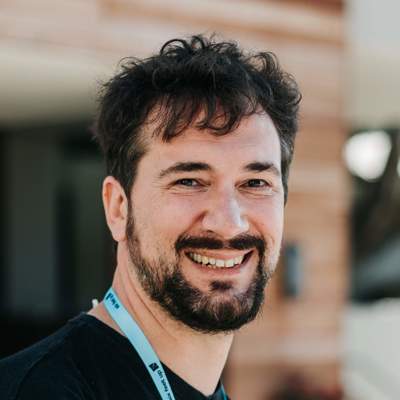

Paolo Melchiorre
PSF fellow · DSF director · Python developer · Django contributor · Django Girls coach · Djangonaut Space navigator · PyCon Italia organizer · Python Italia member · Python Pescara founder · Universit
Pescara, Italy
Actions
I'm Paolo Melchiorre (aka paulox) — Python backend developer, Django contributor, and Python Software Foundation Fellow.
Django Software Foundation Director, Django Girls+ coach and organizer, and proud Djangonaut Space navigator.
Organize PyCon Italia, founded Python Pescara, and I'm a Python Italia member.
Also, a conference speaker, GNU/Linux user, Free Software advocate, University of Bologna alumnus, Computer Engineer and technical blogger.
Links
Area of Expertise
Topics
Advent of Python: il panel
Dedicheremo il talk commentare a più mani Advent of Code affrontato con Python in 4 persone
Ognuno presenterà uno o due esercizi che hanno trovato interessati o particolari, condividendo il codice.
Ognuno parlerà di alcune giornate, ma faremo anche dei paralleli con le stesse giornate con soluzioni diverse.
L'obiettivo non è presentare la soluzione migliore, ma parlare dell'esperienza e riportare le cosa che ci hanno interessato di più immesso più in crisi.
Managing Youtube reports with Django and PostgreSQL
Youtube is the most used video sharing website in the world and contains a volume of video and data that is impressive to imagine, its ease of use hides the complexity of the data required for its operation and especially for monetization.
In this talk we will see how we managed to interact with the economic reports of many Youtube channels, import a large volume of data through Google's APIs and create a web service based on the intelligent aggregation of these data.
To interact with the Youtube Reports API and to download the data, we used the official Python client library for Google's discovery based APIs.
To create the Web service and all asynchronous task we used Django Web Framework and the uWSGI application server.
To store the large volume of data and import it quickly we used the PostgreSQL database.
Semantic search with Django, PostgreSQL, & pgvector
Artificial intelligence is now a required functionality in many fields, and we often find ourselves needing to add to existing projects.
The first problem to face is that of having to store the vectors, there are vector databases ready to use, but they also introduce new problems, fortunately pgvector allows us to continue to exploit PostgreSQL for this purpose.
In this talk we will see how to add semantic search functionality to an existing Python-based web project, in particular Django, with data storage on PostgreSQL.
Maps with Django (and PostGIS)
A map in a website is the best way to make geographic data easily accessible to users because it represents, in a simple way, the information relating to a specific geographical area and is in fact used by many online services.
Implementing a web map can be complex and many adopt the strategy of using external services, but in most cases this strategy turns out to be a major data and cost management problem.
In this talk we'll see how to create a web map with the Python based web framework Django using its GeoDjango module, storing geographic data in your local database on which to run geospatial queries.
Through this intervention you can learn how to add a map on your website, starting from a simple map based on Spatialite/SQLite up to a more complex and interactive map based on PostGIS/PostgreSQL.
Make the most of Open Source
Taking full advantage of **Open Source** software means getting involved in its **community** and **contributing** to its development.
We will see how this is profoundly true in particular in the **Python** community as well.
In this talk we will see together the way I found for anyone to take full **advantage** of an Open Source software while **contributing** to its success and that of its **community**.
I'll share a lot of **examples** from my personal participation in the the Python and **Django** community.
Django with PostgreSQL superpowers
Every time we’re going to create a new project with Django we make assessments on its requirements to choose the best architecture, of which, the database is usually the core.
Django is a database-agnostic web framework but natively supports only 4 Open Source databases: PostgreSQL, SQLite, MariaDB and MySQL.
PostgreSQL has the richest feature set of any supported database and some of these features are natively supported directly in Django via its contrib module.
In this talk we’ll see how to use to our advantage the features of PostgreSQL as a database in Django, its exclusive features present in its contrib module and also other superpowers that can be exploited through the use of third-party packages.
POSETTE: An Event for Postgres 2024 Sessionize Event
Citus Con: An Event for Postgres 2023 Sessionize Event
DevFest Pescara 2022 Sessionize Event
Citus Con: An Event for Postgres Sessionize Event
GDG DevFest Pescara 2019 Sessionize Event

Paolo Melchiorre
PSF fellow · DSF director · Python developer · Django contributor · Django Girls coach · Djangonaut Space navigator · PyCon Italia organizer · Python Italia member · Python Pescara founder · Universit
Pescara, Italy
Links
Actions
Please note that Sessionize is not responsible for the accuracy or validity of the data provided by speakers. If you suspect this profile to be fake or spam, please let us know.
Jump to top